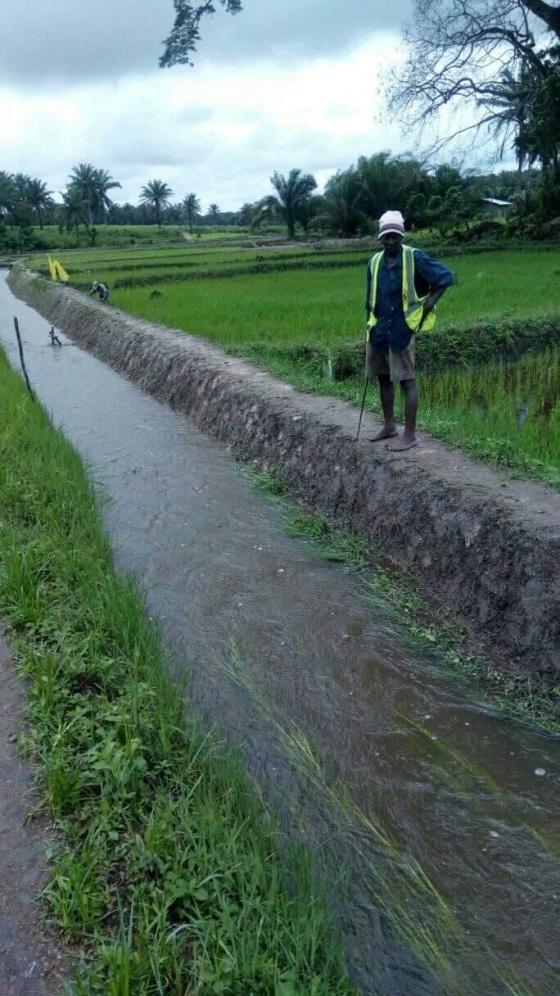Liberia: WFD 2023 Underscores Significance of Water to Improve Food systems

The Makona River Farm irrigates lowland rice fields in Lofa County.
Liberia: WFD 2023 Underscores Significance of Water to Improve Food systems
As countries celebrate World Food Day, the theme of this year’s celebration which is “ We must not take water for granted: We must work together to manage a finite precious resource,” served to challenge or remind a nation like Liberia to invest more into irrigation systems to improve food security.
Though Liberia is making some efforts to improve on irrigation systems, mainly for lowland rice cultivation to increase domestic rice supply, funding for such an initiative remains huge. Liberia is blessed with vast lowland for irrigation purposes. But, it seemed as though much of the lowland in Liberia is not yet well irrigated. An irrigation system enables the cultivation of food crops such as rice at least three times a year in Liberia.
Every year, the globe observes World Food Day on October 16 with the goal of bringing attention to and taking action against global hunger and malnutrition. This day serves as a reminder of the need to ensure food security and everyone's access to wholesome food. Liberia is yet to host a formal program in celebration of the day, however, the country is among several countries that should observe the day.
According to the Food and Agriculture Organization (FAO) of the United Nations, Director General Dr. Qu Dongyu this year’s World Food Day celebrates one of the planet’s most precious resources: water.
The message of the Director General said that water is essential to life on Earth.
According to him, water covers the majority of the planet’s surface, makes up over 50 percent of our bodies, helps keep us fed, supports livelihoods and is central to achieving the 2030 Agenda for Sustainable Development and the Sustainable Development Goals (SDGs).
The Director General said mankind needs to approach the complex challenge of shielding the existing freshwater resources and aquatic food systems from pollution and the impacts of the climate crisis, while ensuring that people have equal access to water.
“About 70 percent of all freshwater going to agriculture, changing the ways nations produce food, fiber, and other agricultural products is the most crucial task. It is also where failure to act will have the gravest consequences,” he said.
He mentioned that over the last two decades, the earth has lost approximately one-fifth of the freshwater available.
“For some people, the reality is much worse. In some regions, in fact, it runs closer to one-third,” he said.
Dongyu said unless people act urgently, we are on course to increase our water use by more than a third by 2050 globally, given our planet’s growing population. That means, collectively, we risk reaching a point of no return.
He mentioned that rapid population growth, urbanization, industrialization, economic development, and the climate crisis have all taken a toll on our water resources. Combined with water pollution, over-extraction and lack of coordinated management, this creates a complex mix of overlapping challenges.
“Increased extreme weather events, drought and flooding are stressing our ecosystems, with daunting consequences for global food security. Smallholder farmers, particularly the poor, women, youth, Indigenous Peoples, migrants, and refugees, are the most vulnerable,” the director general message read.
Approaching a complex challenge
He stressed that at the heart of the balancing act to address these combined challenges must be securing sufficient water for agriculture, while reconciling the competing water needs of other economic activities, especially as urbanization accelerates.
“Good governance is crucial for sustainable and equitable water allocation, through an integrated and inclusive approach with all partners. Water governance and tenure, water pricing, regulations, and incentive measures, are needed to drive change and ensure equitable access to clean and safe water resources,” he added.
The Director underscored the need to implement integrated water resources management through coordinated development and management of water, land, and related resources to maximize human well being, without compromising the sustainability of vital ecosystems.
According to him, investment in innovative, efficient water management practices is vital, including in modern irrigation and storage technologies and science-based solutions to address water scarcity and harnessing flooding; so that we are building a water-saving and resilient society, including through managing more effectively the water-food-energy nexus.
Action on the ground
The Director General in his message said “We can and are working to make these things happen. He made particular mention of the work of FAO in the Sahel by providing mechanization opportunities to farmers to improve their water infrastructure and at the same time supporting rural women and their households to access water.
